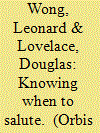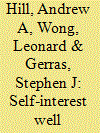|
|
|
Sort Order |
|
|
|
Items / Page
|
|
|
|
|
|
|
| Srl | Item |
| 1 |
ID:
080767


|
|
|
|
|
| Publication |
2008.
|
| Summary/Abstract |
Due to a strong "Can Do" spirit and a well-engrained, albeit simplistic, notion of civilian control over the military, senior military leaders are disinclined to publicly share their disagreement with emerging national security policy. Many senior officers mistakenly believe that there are no alternatives other than just silently executing, resigning, or retiring when confronted with bad policy formulation. There are, however, options available to senior uniformed leaders when confronted with policy formulation that they, in their professional opinion, believe is flawed. Depending on the degree to which the civilian authorities are receptive to military advice and the magnitude of the threat to national security involved in the policy, senior military leaders can choose among many alternatives to widen the policy debate
|
|
|
|
|
|
|
|
|
|
|
|
|
|
|
|
| 2 |
ID:
121046


|
|
|
|
|
| Publication |
2013.
|
| Summary/Abstract |
In recent decades, the U.S. military has enjoyed high levels of public confidence. We argue that the rise (and sustainment) of public confidence in the military reflects two phenomena. First, the public has a high regard for the military and its mission, arising from a shift to a professional (nonconscript) force that is perceived to be competent, fair, and accountable. Second, the public has little fear of military abuses in the domestic arena, owing chiefly to the reduced domestic presence of the military in the post - World War II era, with less emphasis on the physical defense of the homeland; and to the military's careful cultivation of an apolitical culture since Vietnam. We conclude with a brief discussion of the military's efforts to develop and encourage public-mindedness among its members, and the challenges to replicating the military approach in other institutional settings.
|
|
|
|
|
|
|
|
|
|
|
|
|
|
|
|
|
|
|
|
|